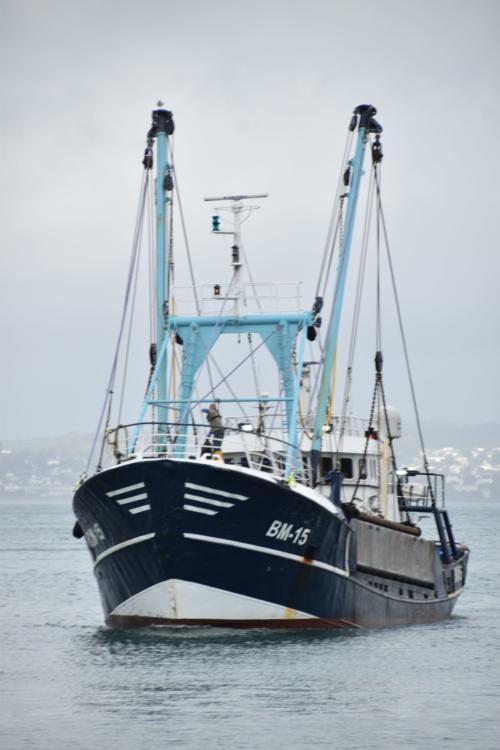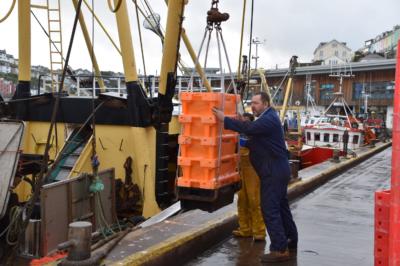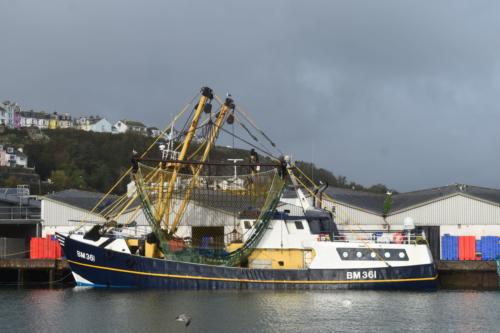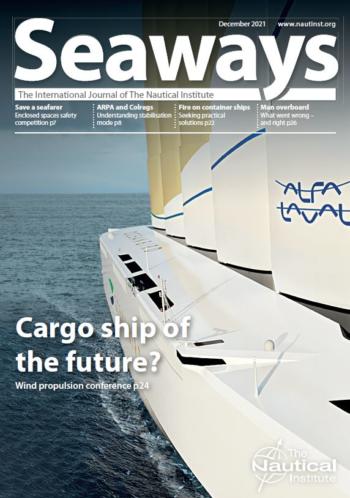From Seaways - December 2021
Free Article - The drive for fishing vessel safety management. A Seafarer's Charity initiative
The drive for fishing vessel safety management
A Seafarer's Charity initiative
by Captain Jeffrey Parfitt, FNI
Head of Safety & Environment, The Nautical Institute
Seaways is the monthly journal of The Nautical Institute. A wide range of insightful features from our expert members look at best practice and developing trends and reflects on changes in the maritime world. With a lively, practical focus on maritime training, navigation, ship management, technology and more, Seaways provides a unique insight into the maritime industry written by the people who are directly involved. Seaways is free to members of The Nautical Institute, and available by subscription here
Fifty years of The Nautical Institute is almost upon us: a time to reflect upon substantial achievements built upon solid foundations, and our future direction. As we have all recently experienced, our world can be unpredictable and rapidly changing. Even as things change around us, safety and professional standards continue to go hand in hand. As an Institute, and a charity, we need to identify with, support, and give new direction to the charitable objectives that were established all those years ago to meet these new challenges.
I took the position as Head of Safety & Environment with The Nautical Institute in September of this year. It’s a big title with a big remit. Looking at the scope of this position, there are clearly many areas on which we, as the world’s largest and foremost association of professional mariners, could lead and ask questions of those who need to give answers.

Safety for all at sea
The perennial issue of safety takes many forms. If anything, we are spoiled for subject choice: bulk ship construction and bulk liquefaction stability issues, livestock carrier stability, car carrier and container fires, loss of containers, lifeboat incidents, hours of rest, fatigue and mental health, criminalisation of the mariner, passenger/ferry safety, safe manning certificates, MASS vessels, carbon emissions and particulate inhalation.
The list grows.
Most recently, The Nautical Institute has been invited to take part in a pilot project on fishing vessel safety, and this opens a new area of involvement for us. I can almost hear the chorus of disapproval from the shipping purists. However, the original objects of The Nautical Institute are to benefit all ‘those involved in the control of sea-going craft’ – which certainly includes fishing vessels.
The fact is that the global fishing industry has been neglected in terms of safety, employment and construction; more or less everything other than fish quota. The most recent figures from the FAO (Fishing and Agricultural Organisation of the UN) fao.org have estimated the fatality rate in the global fishing industry in excess of 32,000 fishers per year.
The Nautical Institute believes it has a part to play in raising the awareness of safety issues in this industry and by utilising its unique position as a global leader in professional development to try to effect change. As such, the Institute has agreed to assist with a six month UK pilot project into improving fishing vessel safety. The project will focus on voluntary auditing of a variety of fishing vessels, in the hope that a raising of standards in a small area will transfer to the global fishing industry.
We believe there is widespread industry support for this move, not just because it is needed to save lives and prevent injuries in what is widely regarded as one of the most dangerous industries on the planet, but because it is well recognised that better safety standards are actually good for business.
What will the project look like?
The Seafarers’ Charity has received funding of £135,000 from the UK Marine Management Organisation and Trinity House for a pilot project to develop safety management onboard fishing vessels. The funding enables the Seafarers’ Charity to offer professional support for up to 50 fishing vessels in the South West of England to develop their safety management practices to comply with the Fishing Safety Management Code (MGN 596F). The Nautical Institute is a member of the industry steering group leading this initiative, offering insight and experience from its network of maritime experts.
Fishing First Safety Management
The project uses a new service called Fishing First Safety Management, provided by SafetyFolder, which already supports the majority of UK fishing vessels with a free online safety record system. The new service goes beyond that to create a full SMS, explains SafetyFolder director Robert Greenwood:
“The majority of fishing vessels have begun recording risk assessments and safety activity in the SafetyFolder, but the new Fishing First service will give owners professional, customised support to complete a fully auditable Safety Management System for their vessel.
Documentation is to the standard of the Fishing Safety Management Code (MGN 596 F) and is designed to avoid duplication and align with the MCA’s Surveys and Inspections therefore simplifying compliance with legislation.”
Adopting a Safety Management System has been a game changer in protecting workers from injury and saving lives in high-risk industries.
Reducing risk is especially critical on fishing vessels, which remain by far the highest risk industry in the UK with 100 times the risk of death compared to the average UK worker. By adopting an auditable Fishing Safety Management System, operators are documenting all their safety and welfare activity and have peace of mind that they are compliant with regulations. The data can also be produced as evidence of compliance during MCA vessel certification inspections.
There has been widespread support across the industry to develop a new audit structure for implementation of this safety management system – another area where the NI can provide valuable support. According to David Fenner, Head of Fishing Safety at the MCA:
“The development of Safety Management Systems and ensuring that data contained within them is a good match with the regulatory requirements, are important contributions to safety. This will lead to more operators having a good quality system in place for the safe management of operations on board their fishing vessels.”

Supply chain transparency
Both consumers and the wider seafood industry have a growing interest in sustainability and transparency of how seafood is caught. Consumers and the supply chain are looking more closely at ethical issues around how food is produced and working conditions for those involved. Operators adopting a fully auditable safety system for their business can demonstrate supply chain transparency and develop the potential to add value to their business as a producer of ethically sourced seafood.
The Seafarers’ Charity is improving the lives of seafarers every day and a big part of that is making sure fishers can work and return home safely from voyages without experiencing harm or accidents. The Nautical Institute is pleased to support this initiative as part of its charitable role to enhance and promote professional development and good practice for those involved in the control of sea-going craft.

To read the full edition of Seaways please click here
The Nautical Institute is an independent, international body promoting the standing of the maritime profession afloat and ashore. The objects of the Institute are to promote and co-ordinate in the public interest the development of nautical studies, so as to encourage and promote a high standard of qualification, competence and knowledge among those involved in the control of sea-going craft.

